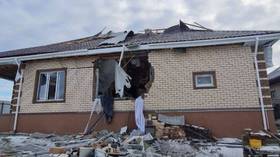Covid-19 triggered wave of ‘fraud and quackery’ in medical research, leading ethicist warns

A leading ethicist is sounding the alarm over a flood of potentially substandard pandemic research which may endanger lives through ill-informed public policy, while damaging medical and scientific practice itself in the process.
There has been a surge of almost 4,000 recently-published papers related to Covid-19, many of which have been of questionable quality, according to Professor Katrina Bramstedt from Bond University, Queensland, who is also secretary general at the Luxembourg Agency for Research Integrity.
Bramstedt recently published her own study examining the poor quality of Covid-19 research, which forms the basis of her recent criticisms.
Amid the rush to print the latest updates and ‘breakthroughs’ in Covid-19 research, there has been a slew of retracted research papers, following an unprecedented number of submissions to pre-print servers, which carry out fewer quality assurance and due diligence checks than established medical journals.
“No research team is exempt from the pressures and speed at which COVID-19 research is occurring. And this can increase the risk of honest error as well as deliberate misconduct,” Bramstedt says.
Check out my new #research paper about #COVID19 fraud and quackery published with @SpringerNature and @DrugInfoAssn. What are the harms and how can this #fraud be prevented? https://t.co/jha2hpSTIm#bioethics#MedTwitter@US_FDA@WHOpic.twitter.com/YIZvZcgyVq
— Prof Katrina Bramstedt 🇦🇺 🇮🇹 (@AskTheEthicist) October 2, 2020
The rapid spread of the pandemic and the growing public thirst for information forced researchers into overdrive looking for treatments, vaccines, and cures potentially endangering patients, medical practitioners, and potentially government policy.
As of July 31, 2020, 19 published articles and 14 preprints about Covid-19 have been retracted, withdrawn or been seriously called into question with regards to the quality of their data. Over 57 percent of these papers come from Asia, over half of which came from China.
There were concerns reported over falsified data, issues with methodology, irregularities in interpretation of data, and conclusions among a multitude of other issues.
Also on rt.com I’ve lost all trust in medical research – the financial muscle of Big Pharma has been busy distorting science during the pandemicEven the paragons of medical research best practice, the Lancet and New England Journal of Medicine, were forced to retract two preprints and two research papers due to the presence of unverified data shared by all four.
“Patient harm that is significant, permanent and irreversible could result from using faulty research results from preprints as well as published papers,” she adds.
Bramstedt highlights the time and resource constraints under which researchers, their supervisors, as well as publishers and their editors are operating under as a major factor in the plethora of poor quality research.
Add to the mix the fact that many peer reviewers work on a voluntary basis with competing demands on their time, especially as they face uncertainty through the pandemic, and issues with quality control are largely inevitable.
At the same time, convening cross-disciplinary meetings of leading immunologists, microbiologists, and lung disease specialists on a consistent basis to share, review, and discuss research during such trying times is increasingly difficult.
Given what’s at stake, Bramstedt proposes an overhaul of the submissions process to make it more efficient, while also introducing mandatory ethics and integrity training for researchers.
“Research has the potential to enter the public domain and be used by many stakeholders, including governments and policy makers, so the data must be robust,” she concludes.
Think your friends would be interested? Share this story!












